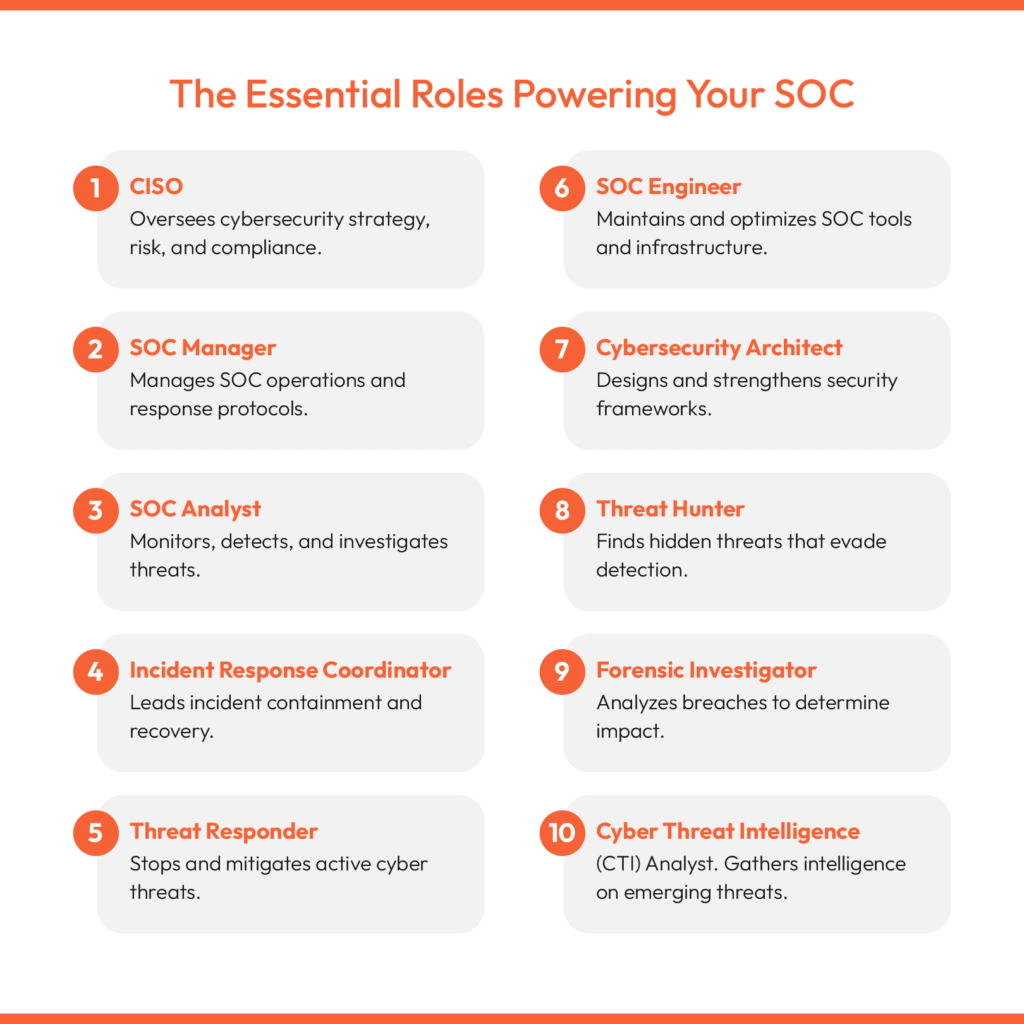Cyberattacks surged by 75% in 2024 compared to 2023, with education, government, and healthcare industries taking the biggest hits.It’s a stark reminder that for enterprises, regulated industries, and any organization handling sensitive data, a well-equipped Security Operations Center (SOC) isn’t optional—it’s essential. Your SOC is the first and last line of defense, operating 24/7 to detect, investigate, and neutralize threats before they escalate into full-blown security incidents.
A core SOC team usually has analysts, incident responders, managers, and engineers. But as threats evolve, so do operational demands. More sophisticated attacks, compliance requirements, or an increasing volume of security alerts may require expanding your team—whether that means adding compliance specialists, threat intelligence analysts, or simply more hands to keep up with the workload.

But let’s be honest—scaling an SOC isn’t easy. The cybersecurity talent pool is limited, hiring and retention costs are steep, and a bigger team means more coordination, refined workflows, and ongoing training to keep everyone aligned. The question isn’t just how to scale—but how to do it without breaking the bank.
Why Nearshoring Could Be the Boost Your SOC Needs (Without Draining Resources)
Nearshoring your SOC operations comes with significant advantages, offering access to specialized talent while keeping costs under control. Here’s why it’s a smart move:
- Faster, Targeted Hiring – Finding cybersecurity professionals can take over six months according to a Kaspersky survey. Nearshoring skips job boards and connects you directly with vetted experts who have hands-on experience with the latest security threats and tools. This minimizes ramp-up time and keeps your SOC fully operational.
- Access to Niche Expertise: Access to Niche Skills – Get hard-to-find SOC analysts, AI/ML security experts, engineers, security architects, and compliance specialists without the sourcing and vetting struggle. Nearshore teams often include specialists in cloud security, Zero Trust frameworks, and incident response, covering critical gaps as threats evolve.
- Pre-Vetted Talent: Nearshoring firms rigorously assess candidates for certifications, technical skills, and cultural fit, eliminating hiring guesswork. Many conduct live technical assessments, simulated threat detection exercises, and behavioral interviews to ensure candidates meet enterprise SOC standards.
- Flexible, Cost-Effective Scaling: Avoid the overhead of full-time hires. Scale your team up during peak threats, compliance audits, or high-risk events and down when workloads stabilize, only paying for what you need. Some nearshoring partners also offer dedicated teams or on-demand specialists, reducing response time to critical incidents.
- Fresh Insights & Operational Gains: Nearshore providers bring cross-industry experience and threat intelligence, helping optimize SOC workflows, automate low-level tasks, and fine-tune detection rules. They can also offer insights into threat trends specific to different industries, improving overall risk posture.
Say you’re a mid-sized company facing a sudden surge in cyberattacks but struggling to hire enough analysts. Building an in-house SOC from scratch could take months and cost a fortune. By leveraging models like our staff augmentation service, you can quickly bring in experienced cybersecurity professionals, reducing costs and ramp-up time while strengthening your defenses.
At BairesDev, this is exactly what we do. We rigorously vet our talent—over half of our engineers have 10+ years of experience—and can deliver a vetted SOC roles in as little as two weeks.
Staff Augmentation: Filling the Gaps in Your SOC Team
If you need to scale your SOC while keeping full control over operations, staff augmentation is a flexible, cost-effective way to do it. Here’s how it could work in a fintech scenario:
1. Scaling Up When It Matters
A fintech company faces a 30% spike in fraud attempts, overwhelming its SOC team. Hiring full-time analysts takes months, but bringing in an outsourced threat responder immediately strengthens fraud detection and response.
2. Handling Compliance Without the Headache
With PCI-DSS (Payment Card Industry Data Security Standard) and GDPR (General Data Protection Regulation) audits approaching, they need compliance expertise fast. Instead of hiring full-time, they bring in a specialist for six months to handle policies, monitoring, and reporting.
3. Seamless Team Expansion
To improve fraud detection and response times, they add a SOC engineer with AI-driven security experience. He integrates smoothly, optimizes detection rules, and cuts response time in half.
4. Smarter Spending, Not Bigger Budgets
Rather than committing to full-time hires, they augment their SOC with two specialists on a contract basis—saving 40% while maintaining strong security coverage.
5. Expertise That Actually Fits
A nearshoring partner provides professionals skilled in fraud analytics, PCI compliance, and SIEM optimization. With experience across multiple fintech firms, they know exactly what’s needed to hit the ground running.
Staff augmentation fills immediate gaps, but long-term resilience requires investing in your own team. While external experts keep your SOC agile, upskilling your workforce and bringing in fresh talent ensures continuity and reduces reliance on outsourcing.

Workforce Development: Building Long-Term Resilience
If you’re planning to build your own SOC, there are a few things to think about:
Upskilling Your Team
With the ongoing cybersecurity talent shortage, hiring new experts isn’t always an option. But if you already have developers or IT professionals interested in security, why not help them grow? Certifications like CISSP, CEH, or GIAC, combined with hands-on training, can turn your existing talent into SOC-ready professionals.
Beyond traditional cybersecurity skills, AI-driven threats are changing the game. Attackers are leveraging AI for automated phishing, deepfake-based fraud, and AI-powered malware. Your team needs to stay ahead by learning AI-based threat detection, adversarial machine learning, and automation-driven security response.
Partnering With Universities
Tapping into emerging cybersecurity talent through universities can help bridge the skills gap. Setting up internships, mentorship programs, or sponsored training gives students hands-on SOC experience and helps you assess potential hires early. Offering scholarships for cybersecurity degrees or certifications not only supports up-and-coming talent but also positions your company as an industry leader, attracting more skilled professionals in the long run.
The ROI of development
Investing in in-house talent creates a more experienced, loyal SOC team that deeply understands your tools, processes, and security priorities. But external expertise still plays a role—outsourced specialists can fill skill gaps or provide additional support when threats spike. The key is finding the right balance between building internal expertise and leveraging external resources to keep your SOC strong, agile, and ready for whatever comes next.

Your SOC Strategy in Action
Building an effective SOC means looking at different strategies, like nearshoring operations, augmenting your staff, or upskilling your current team. The right mix depends on your needs—whether it’s filling immediate skill gaps, optimizing workflows, or preparing your team for AI-driven threats.
If you’re looking for a nearshoring and staff augmentation partner to bridge skill gaps or improve your SOC’s efficiency, reach out to our team. We can help you build a stronger, more adaptable security operation—without the long hiring cycles or overhead costs.







